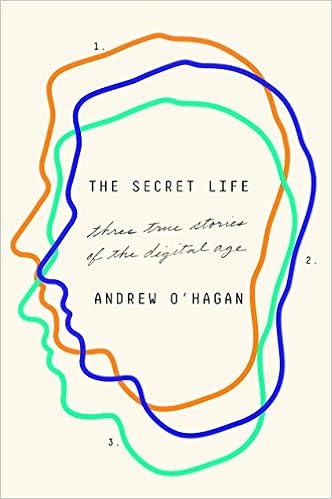
How do you write a compelling book about the internet? Decades after computers started reordering our lives, it’s a question nonfiction writers are still struggling with. The speed with which the digital world changes; the difficulty of dramatising people peering at screens and typing; the less than vibrant emotional lives of key online protagonists – all these can make internet books seem rather grey and out of date compared with the Technicolor, distracting swirl of the internet itself.
Andrew O’Hagan’s solution is to write about three “outlaws” from “the wild west of the internet”: Julian Assange, the founder of WikiLeaks (right); Craig Wright, who claims to be the inventor of the online currency bitcoin; and Ronald Pinn, an almost completely forgotten Londoner who died in 1984, whose identity O’Hagan borrows to create a fictitious digital persona. “My three case studies are individual, and in many ways they are typical of nothing but themselves,” O’Hagan writes with studied modesty in his foreword. But then he can’t resist adding more ambitiously: “They might each tell a story about the times we are living in.”
In January 2011, at the peak of Assange’s fame as a political disruptor and challenging personality, O’Hagan was asked by the publisher Canongate to ghostwrite a book for him. Sketchily defined as a mixture of memoir and manifesto, it had been bought by Canongate for £600,000, as well as by dozens of foreign publishers. O’Hagan is a busy author, but he accepted the commission almost immediately, for “the thrill” of getting the inside story about Assange, and the “authorly freedom” he thought would come with being an undeclared ghostwriter. Later that month, he drove to the country house in Norfolk where Assange was then confined after being arrested for alleged sexual assaults in Sweden (an investigation that has now been dropped) and then released on bail.
O’Hagan describes the initial stages of his descent into the Assange vortex with a lovely wit and confidence: “I got to Ellingham Hall … I’d been told there were journalists everywhere and indeed there were lights around the fields and sometimes helicopters overhead. I looked at the driveway under a full moon. It felt almost comically filmic ... character and power waiting to combust.” Like revolutionaries who have seized a mansion, Assange and his younger followers slob around the house, half triumphant and half listless, keeping strange hours, working on various WikiLeaks plots, and eating large dinners “prepared by the housekeeper”. One night, O’Hagan notes sharply, Assange “had three helpings of lasagne”, then ate “jam pudding with his hands”.

FacebookTwitterPinterest Craig Wright, who claims to be the inventor of the online currency bitcoin. Photograph: Mark Harrison/Handout/PA
The Australian computer genius is memorably portrayed as a messianic, brittle figure, railing constantly against perceived enemies, including his former collaborators at the Guardian. O’Hagan, one of literary journalism’s great charmers, nevertheless finds things to like about him: “He was amused and suspicious at the same time, a nice combination I thought.” But as it becomes clear that Assange has no intention of helping with their supposedly collaborative book project in any sustained or deadline-conscious way, and the whole much-hyped enterprise collapses, even O’Hagan gradually loses his composure. The prose here switches from urbane to angry, and loses its pleasing economy. The narrative arc freezes frustratingly in the wintry Norfolk air.
A different sense of opportunities missed hangs over the other half-book here, about Wright’s 2016 attempt to prove he was the creator of bitcoin, and therefore resolve “one of the great mysteries of the internet”, as O’Hagan perhaps overstates it. Again, his subject is a middle-aged man whose brain and sense of paranoia are much larger than his social skills. Again, O’Hagan is chosen as his subject’s official chronicler, by a company called nCrypt, which hopes to use Wright’s bitcoin declaration as a way to publicise his “hundreds” of online inventions, O’Hagan writes, and then “sell the intellectual property for upwards of a billion dollars”.
All three stories end with dramatic, finely drawn paragraphs – the literary journalist emerging, skills intact
The narrative is fuller this time. It alternates between slightly chewy passages about the workings and history of bitcoin – the internet proving resistant to vivid explanation, yet again – and accounts of meetings in Mayfair restaurants. Skilfully, O’Hagan intertwines his investigation into whether Wright is telling the truth with Wright’s own jittery journey towards the day of his big bitcoin declaration. As with Assange, the author builds a relationship with Wright that is close and concealed from the outside world, but not credulous: “Wright asked me to come to his office so he could draw something for me on his whiteboard, a new timelock encryption scheme he’d come up with … His expertise in certain areas was startling, and so were his obfuscations.”
The risk of this kind of inside-track reporting is beginning to sound like your subject. Even the most refined writers can end up sounding both geeky and macho if they spend a lot of time with male internet moguls. “The nCrypt boys,” O’Hagan writes at one point, “appeared to have no Plan B.” Parts of his Wright story read more like breathless business journalism or a melodramatic crime drama than something in the London Review of Books, where all the pieces in this book previously appeared.
The briefest one here, about building a fake online personality, is cooler in tone. A deadpan O’Hagan describes the drugs and weapons and other illicit possibilities that the internet can offer disguised or anonymous purchasers. But little of this exploration feels revelatory: the scary depths of the dark web have been a tabloid staple for years. O’Hagan’s reaction to this “wild west” is of course more interesting and nuanced, alarm and fascination competing with each other, without a winner ever quite being declared. In parallel, he also conducts a melancholy search for traces of the dead man whose identity he has borrowed, and the less glossy, more working-class London he once inhabited. As in all three stories here, the search ends with some dramatic, finely drawn paragraphs – the literary journalist emerging, skills intact, after his time among the internet’s less sensitive stylists.
This book is too fragmentary and recycled to be a definitive encounter with the internet. Only a brief foreword and a few updated sections are new material. And O’Hagan’s position in the pieces – as the invited confidant of his subjects – ultimately feels too comfortable. The real stories of our computer age are probably elsewhere, in the web’s still underscrutinised history, or in the factories, far from Norfolk country houses and smart London restaurants, where addictive devices and fake news stories are produced. More writers need to go there.
No comments:
Post a Comment